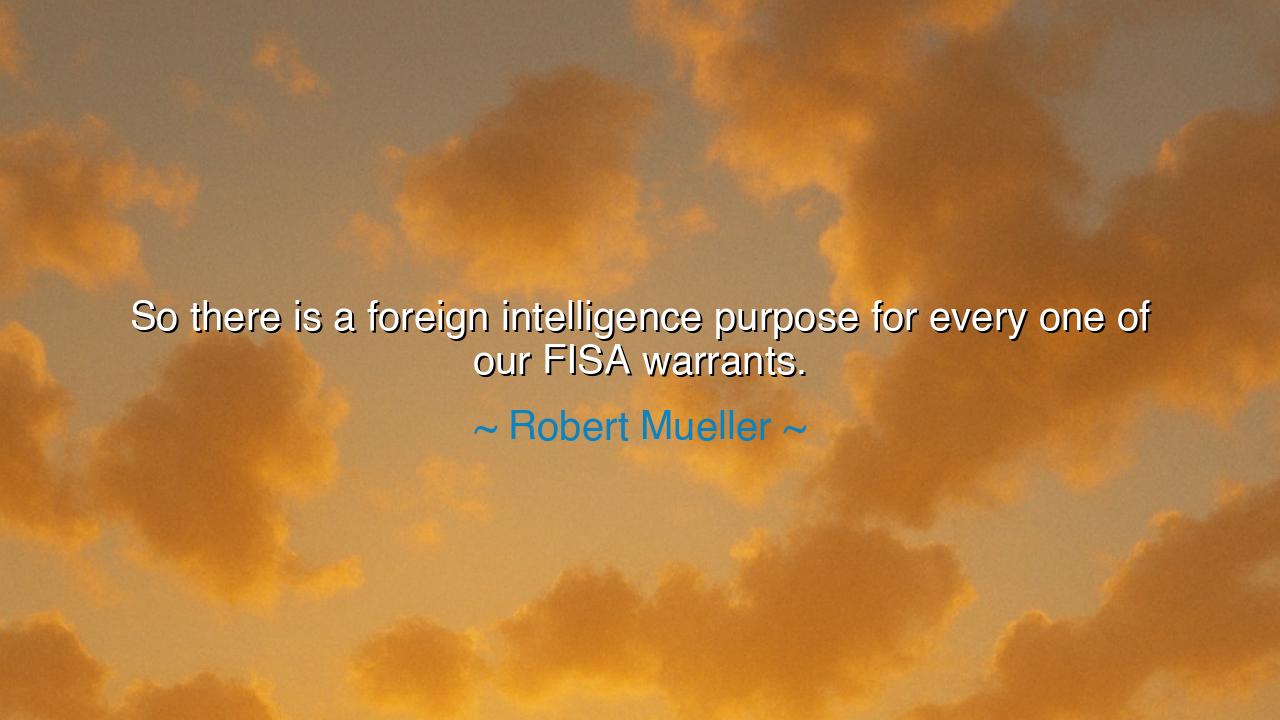
So there is a foreign intelligence purpose for every one of our






“So there is a foreign intelligence purpose for every one of our FISA warrants.” Thus spoke Robert Mueller, a man of discipline and silence, who stood at the intersection of law and national security during an age of uncertainty and unrest. His words, though technical in sound, carry the weight of duty, the solemn rhythm of justice wielded not for conquest, but for protection. In them lies a truth both eternal and perilous — that power, when used in the shadows, must be bound to purpose, lest it devour the very liberty it seeks to defend.
To understand this saying, one must know its origin. The Foreign Intelligence Surveillance Act, or FISA, was born in 1978, in the wake of scandals that revealed the dangers of unchecked authority. It was crafted to bring balance between security and freedom, between the nation’s need to see its enemies and its obligation to shield its citizens from intrusion. When Mueller declares that “every warrant has a foreign intelligence purpose,” he invokes this sacred covenant — the promise that the tools of secrecy and surveillance are not weapons of convenience, but instruments of necessity. They exist to serve a higher cause: the protection of the realm from threats beyond its borders, the unseen foes that move beneath the calm surface of peace.
In this way, Mueller’s words echo the wisdom of the ancients who governed in perilous times. Cicero, the Roman orator, once said, “The safety of the people shall be the highest law.” Yet even he warned that safety purchased at the cost of virtue becomes tyranny. So too does Mueller’s statement remind us that intelligence gathering must serve not the desires of rulers, but the foreign purpose — the defense of the people and the preservation of order. Without this guiding star, the eye that watches for danger may turn inward and corrupt the very soul it was meant to protect.
History bears grim witness to this truth. In the final days of the Roman Republic, the Senate gave Julius Caesar extraordinary powers to protect the state from its enemies. But in granting him sight beyond limits, they blinded themselves to his ambition. The instruments of defense became instruments of dominion, and the Republic fell beneath the weight of its own vigilance. In modern times, too, nations have stumbled when intelligence was used not for safety, but for suppression. The walls that protect can easily become the walls that imprison. Thus, Mueller’s insistence on purpose is not bureaucratic — it is moral. It is a plea for discernment, for the union of vigilance with virtue.
When he spoke these words, Mueller was not merely describing procedure, but warning of the responsibility that comes with knowledge. Intelligence, like fire, can warm or consume. Each warrant, each secret search, must be lit not by curiosity, but by clarity — the understanding that power must answer to principle. In this, his statement becomes a meditation on ethics as much as on espionage: purpose sanctifies action, but action without purpose leads to ruin.
Yet there is another meaning beneath his words, one that transcends law and politics. In every life, we, too, must act with purpose. Whether in our work, our relationships, or our struggles, it is not enough to move — we must know why we move. The heart that acts without purpose becomes lost, like an army fighting without a cause. Mueller’s wisdom, though born from the world of intelligence, applies to the world of the spirit: intent gives morality to power, direction to strength, and honor to action.
Therefore, O seeker of understanding, learn this lesson well: purpose is the guardian of integrity. In governance, in war, and in life, let your actions be bound to a just reason, not to impulse or ambition. Ask always, “For what do I labor? For whom do I strive? What good will this serve?” Just as the FISA warrant must serve its foreign intelligence purpose, so too must your deeds serve a noble aim. Without purpose, the mighty become reckless, and the wise become vain.
In the end, Mueller’s words remind us that true strength lies not in surveillance, but in self-restraint; not in authority, but in accountability. Power must never forget its mission, and neither must we forget ours. Let every choice we make, like every warrant issued in secret, be guided by a light of pure intent — that in seeking to protect what we love, we do not destroy it. For in every age, as in every soul, the test of integrity remains the same: that the means serve the purpose, and the purpose serves the good.






AAdministratorAdministrator
Welcome, honored guests. Please leave a comment, we will respond soon